what is “google winner email scam”?
The “google winner” scam is distributed via a spam email campaign that tricks people into thinking they have won £950,000.00. in fact, this particular email steals private information by taking users to websites where they are asked to enter login details, passwords, etc.
These emails are often used to distribute malware. therefore, do not trust “google winner” and other similar scams; ignore them.
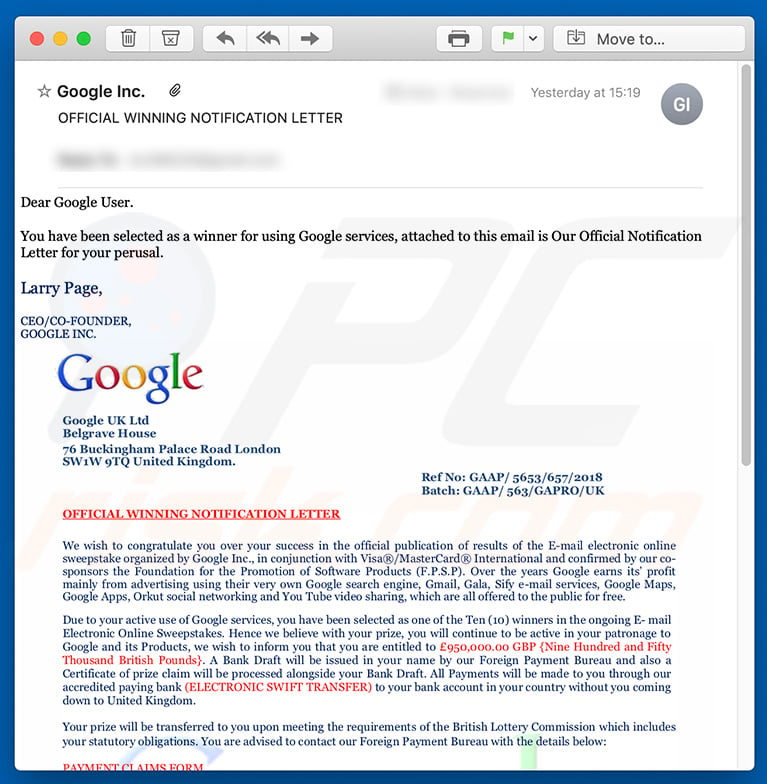
Scammers present the “google winner” email as a winning notification message. indicates that the recipient has been selected as a winner of £950,000.00 for actively using google services (google search engine, gmail, maps, etc).
To claim the prize, users are encouraged to contact the foreign payment office via briancarter@g-reward.com and provide details such as full name, contact address, country and nationality, telephone/ mobile phone, occupation, age and gender, and private email address.
Persons are urged to keep their winning information confidential until the claim is processed and the prize is shipped. as mentioned above this is simply a scam and you should not contact these scammers via email address or submit your details. Please note that Google has nothing to do with this fake online lottery.
As part of the scam, people are provided a web link to a site where they are asked to enter their login details and passwords; this is how scammers use this particular scam to steal personal information.
To remove possible malware infections, scan your computer with reputable antivirus software. Our security researchers recommend using the Combo Cleaner.▼ Download the Combo Cleaner To use the full-featured product, you must purchase a license for the Combo Cleaner. 7 days free trial available. combo cleaner is owned and operated by rcs lt, the parent company of pcrisk.com read more.
There are many scammers who use several different spam campaigns. some examples of other similar scams are seen for several months, I am a developer of spyware and services that I currently sell on the darknet.
In most cases, they try to extort money from regular users, however, some spam campaigns infect computers with high-risk viruses like trickbot, emotet, azorult, adwind, etc. in these cases, people receive emails that contain malicious attachments (or web links that lead to such documents).
The attached documents are usually microsoft office documents (word, excel and others), pdf files, archive files such as rar, zip, executable files, etc.
The purpose of these malicious attachments is to install computer infections that steal personal data (passwords, logins, bank details, etc.) and cause issues related to privacy, browsing safety, financial loss, and other issues. . In addition, the aforementioned viruses also spread other infections such as ransomware.
how do spam campaigns infect computers?
Malicious attachments presented in emails sent by scammers (cyber criminals) infect computers only when they are opened or run. therefore, manual intervention by a recipient is required. if the attached file is a microsoft office document, once it is downloaded and opened, it asks for permission to enable macro recommendations.
enabling them allows the downloaded malicious attachment to install an infection on the computer. if the attached file is a compressed file, it will need to be extracted first.
this will likely contain an executable (.exe) file which, once executed, will install a malicious program. in any case, malicious files (attachments) presented in spam email campaigns cannot cause any harm unless they are opened.
how to prevent installation of malware?
Ignore irrelevant emails received from unknown or untrusted email addresses. if an email contains an attachment (or a web link), do not open it. download software using official and trustworthy websites (or other sources). this does not include various peer-to-peer networks (torrents, emule, etc.), third-party downloaders, etc. please download and install the software carefully.
Do not skip download/install setup steps without checking “custom”, “advanced” and other similar settings or options. opt out of receiving offers to install additional software and only then finish the download/installation. update the software using implemented functions or tools provided only by official software developers.
never use third-party software updates as they are often dubious and install malicious programs.
use a version of microsoft office package no earlier than 2010: newer versions have “protected view” mode, which prevents downloaded malicious documents from installing infections on the computer. If you have already opened malicious attachments, we recommend that you run a scan with a combo antivirus cleaner for windows to automatically remove infiltrated malware.
text presented in the “google winner” email message:
subject: official winning notification letter dear google user. you have been selected as a winner for using google services, attached to this email is our official notification letter for your perusal. larry page, CEO/co-founder, google inc.
screenshot of the pdf document presented in the “google winner” scam:
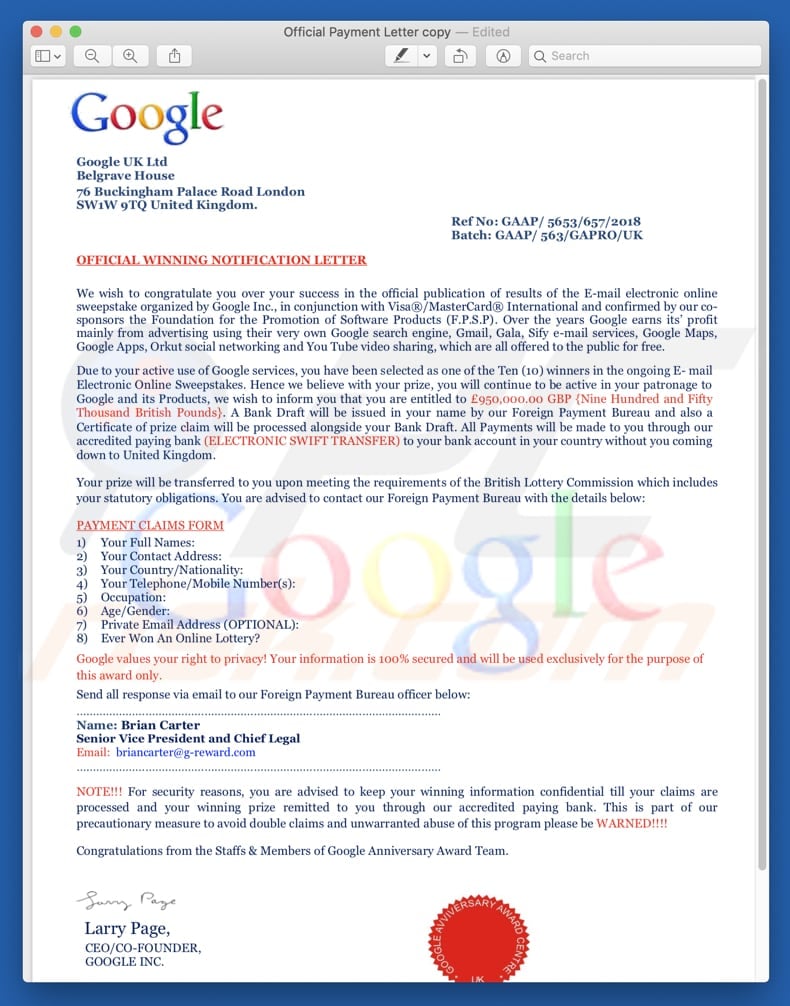
text presented in pdf document:
google uk ltdbelgrave house76 buckingham palace road london sw1w 9tq united kingdom.official winning notification letterref no: gaap/ 5653/657/2018 lot: gaap/ 563/gapro/uk we wish to congratulate you on your success in the official publication of the results of the electronic online email giveaway organized by google inc., in conjunction with visaÆ/mastercardÆ international and confirmed by our co-sponsors, the foundation for the promotion of software products (f.p.s.p). Over the years, Google makes its money primarily from advertising using its own Google search engine, Gmail, Gala, Sify email services, Google Maps, Google Apps, Orkut social media, and sharing. of videos on youtube, all of which are offered to the public for free. Due to your active use of Google services, you have been selected as one of ten (10) winners in the ongoing online email sweepstakes. therefore we believe that with your prize you will continue to be active in your sponsorship of google and its products, we wish to inform you that you are entitled to £950,000.00 gbp {nine hundred and fifty thousand pounds sterling}. our foreign payments office will issue a money order to you and a prize claim certificate will also be processed along with your money order. all payments will be made to you via our accredited paying bank (fast electronic transfer) to your bank account in your country without you having to travel to the uk. Your prize will be transferred to you once you meet the UK Lottery Commission’s requirements, including your legal obligations. we recommend that you contact our payment office abroad with the following details: payment claims form 1) your full names: 2) your contact address: 3) your country/nationality: 4) your telephone/number mobile phone number: 5) occupation: 6) age/gender: 7) private email address (optional): 8) have you ever won an online lottery? Google values your right to privacy. your information is 100% secure and will be used solely for the purposes of this prize only. Email all responses to our Foreign Payments Office Officer below:
name: brian cartersenior vice president and chief legal officeremail: briancarter@g-reward.com
note!!! For security reasons, you are advised to keep winning information confidential until your claims are processed and the winning prize is remitted to you through our accredited paying bank. this is part of our precautionary measure to prevent double claims and unwarranted abuse of this program. members of the google anniversary awards team.
Larry Page, CEO/Co-Founder, Google Inc.©Copyright 2018 GoogleCorporation. all rights reserved.
yet another variant of this email scam:
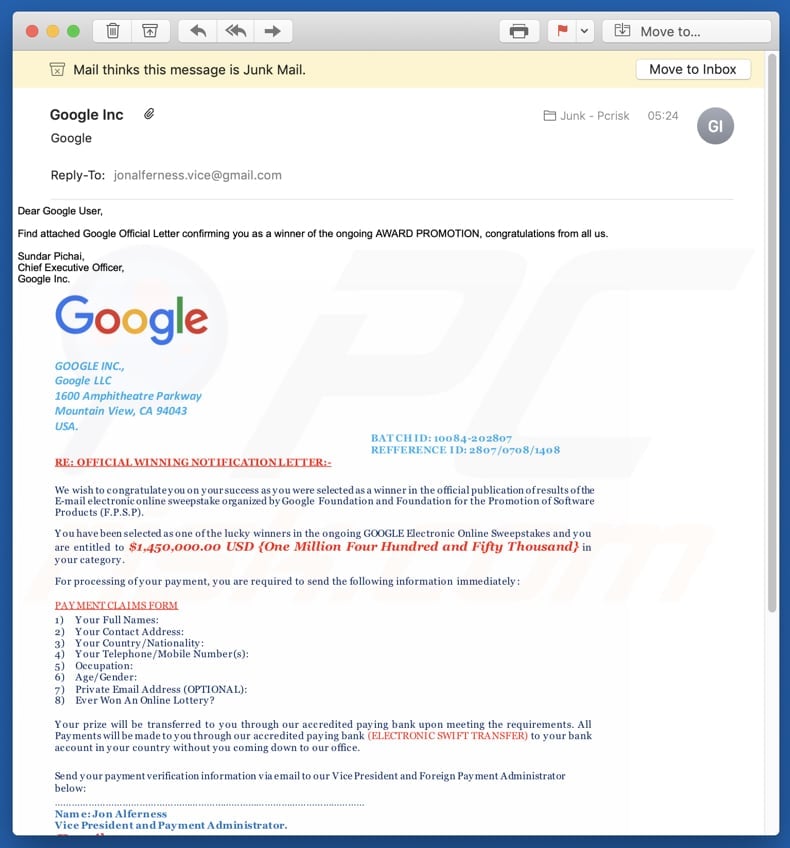
text presented in this variant:
dear google user, please find the attached official letter from google confirming you as the winner of the current prize promotion, congratulations from all of us. Sundar Pichai, CEO of Google Inc.
google inc.,google llc1600 amphitheater parkway mountain view, ca 94043 usa.re: official winning notification letter:-bat ch id: 10084-202807 reference id:2807/0708/1408 we would like to congratulate you on our success as you were selected as a winner in the official publication of the results of the online electronic mail sweepstakes organized by the google foundation and the foundation for the promotion of software products (f.p.s.p). online electronic draws and is entitled to $1,450,000.00 usd {one million four hundred and fifty thousand} in its category. In order to process your payment, you must submit the following information immediately: payment claim form contact address:3) your country/nationality:4) your telephone/mobile number(s):5 ) occupation:6) age/gender:7) private email address (optional):8) have you ever won an online lottery? the prize will be transferred to you through our accredited paying bank upon meeting the requirements. all payments will be made to you through our accredited paying bank (fast electronic transfer) to your bank account in your country without you coming to our office. Email your payment verification information to our Vice President & Foreign Payment Administrator below:… …………………….. …………………….. …………………… ………………………. ………name:jon alferness vice president and payment manager.email: jonalferness.vice@gmail.com …………………. ………………… …………………………. ………………. ………………..note!!! For security reasons, we recommend that you keep this notification confidential as part of our precautionary measure to prevent double claims and unwarranted abuse of this program. Sundar Pichai, CEO, Google Inc.
another malicious attachment (official google and mastercard visa 2019 winning letter.pdf) distributed via this email spam campaign:
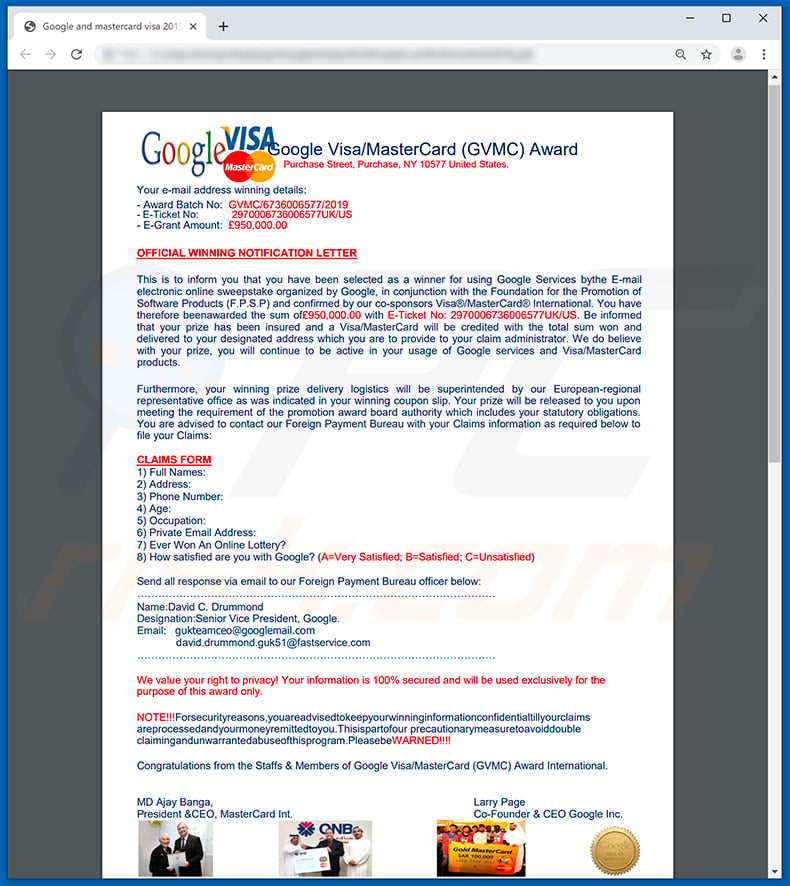
text presented in this pdf document:
google visa/mastercard (gvmc) reward buy street, buy, ny 10577 united states. your email address winning details:- prize lot number: gvmc/6736006577/2019- e-ticket number: 2970006736006577uk/us- e- grant amount: £950,000.00 official winning notification letter this is to inform you that you have selected as a winner for using google services by the online electronic raffle organized by google in conjunction with the foundation for the promotion of software products (f.p.s.p) and confirmed by our co-sponsors visa®/mastercard® international. therefore he has been awarded the sum of £950,000.00 with the e-ticket number: 2970006736006577uk/us. You will be informed that your prize has been insured and a visa/mastercard will be credited with the total amount won and delivered to the designated address which you will need to provide to your claims administrator. We believe that with your award, you will continue to be active in using google services and visa/mastercard products. in addition, the logistics of delivery of your winning prize will be supervised by our European regional representative office, as indicated on your winning coupon. Your prize will be awarded to you once you meet the requirements of the Promotions Award Board authority, including your legal obligations. You are encouraged to contact our overseas payment office with your claims information as required below to submit your claims: Claim Form1) Full Names:2) Address: 3) Phone Number: 4) Age: 5) occupation: 6) private email address: 7) have you ever won an online lottery? 8) how satisfied are you with google? (a=very satisfied; b=satisfied; c=dissatisfied) please email all responses to our foreign payment office officer below:-name: david c. drummond designation: senior vice president, google.email: gukteamceo@googlemail.comdavid.drummond.guk51@fastservice.com- we value your right to privacy! your information is 100% secure and will be used solely for the purposes of this prize only. note! For security reasons, you are advised to keep your winning information confidential until your claims are processed and your money is sent to you. this is a fourth precautionary measure to prevent double claiming and unwarranted abuse of this program. Please Be Careful!!! kudos from the staff & members of google visa/mastercard (gvmc) international award.md ajay banga, larry pagepresident & ceo, mastercard int. co-founder & CEO of Google Inc.
another variant of the “google winner” email spam campaign:
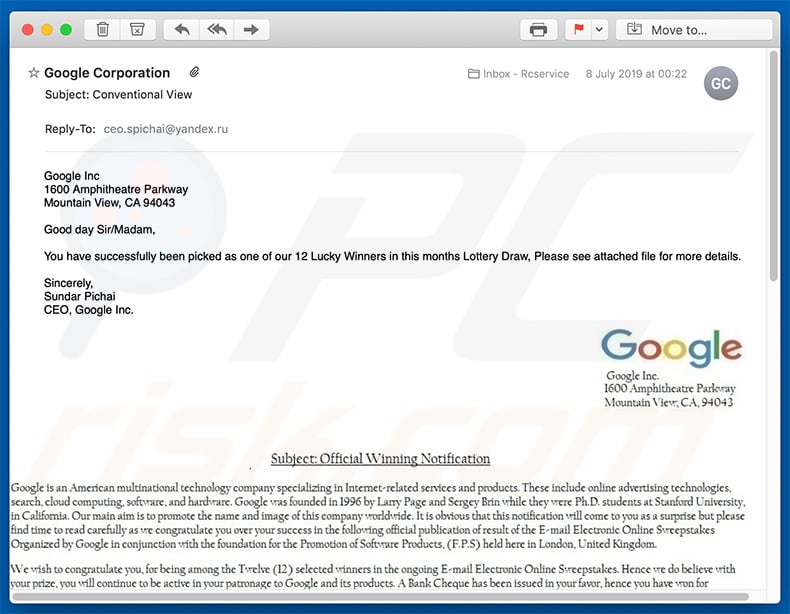
text presented in this email:
subject: conventional view
google inc1600 amphitheater parkway mountain view, ca 94043
good morning sir/madam,
You have been successfully chosen as one of our 12 lucky winners in this month’s lottery draw, please see the attached file for details.
yours sincerely, sundar pichaiceo, google inc.
Screenshot of misleading attachment:
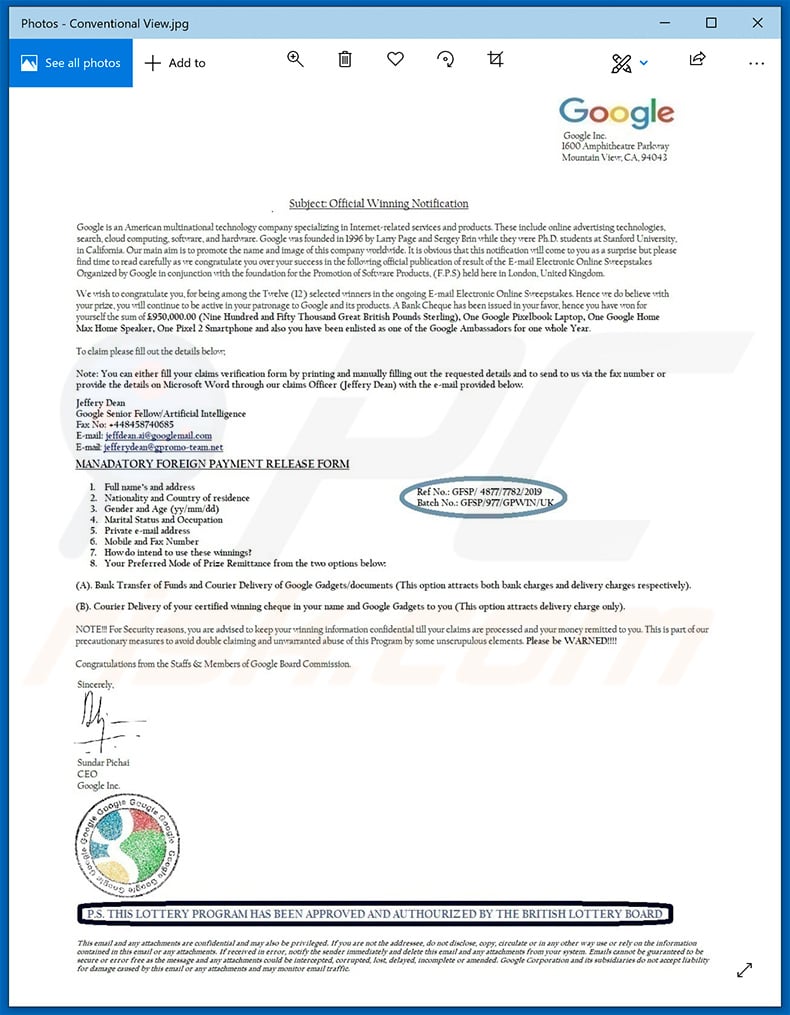
another variant of the “google winner” email spam campaign:
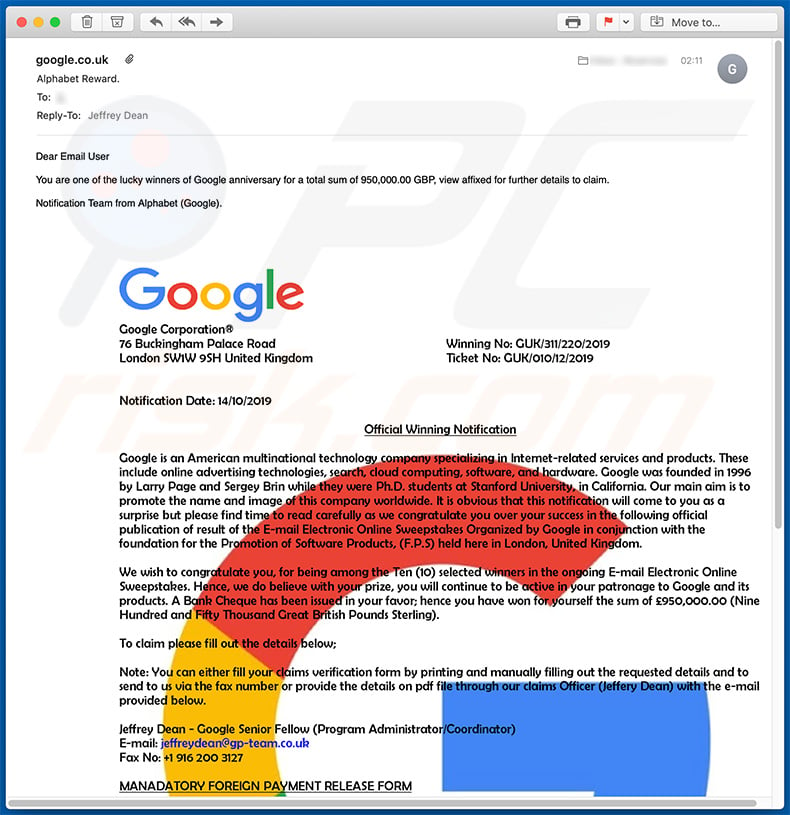
what this email (gif) looks like:
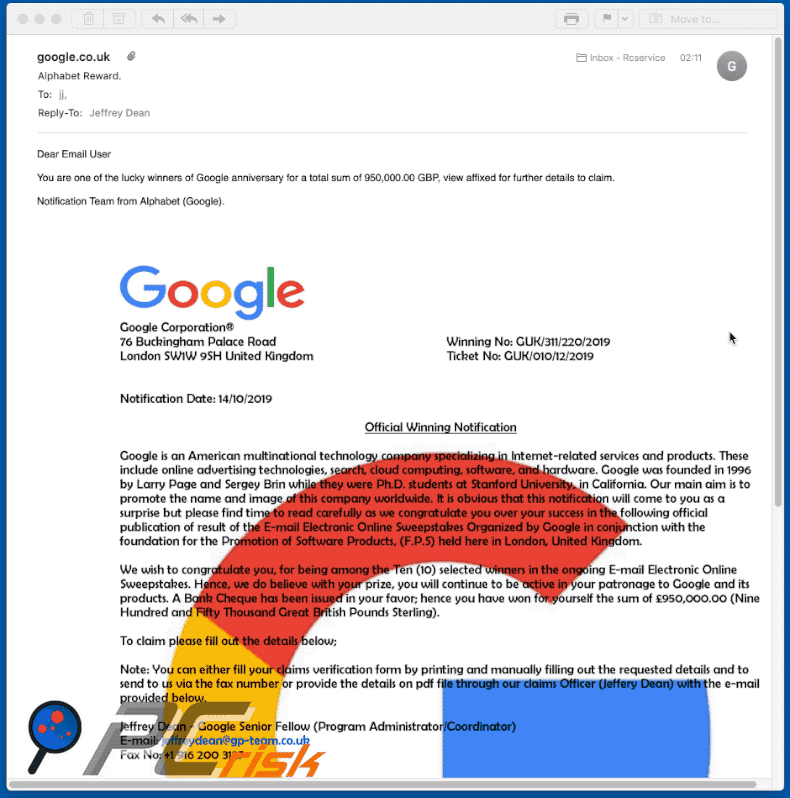
text presented in this email:
dear email user
you are one of the lucky winners of the google anniversary for a total sum of 950,000.00 gbp; see the addendum for more details on how to claim.
alphabet notifications team (google).
>>> attached png file.
another variant of the “google winner” scam email:
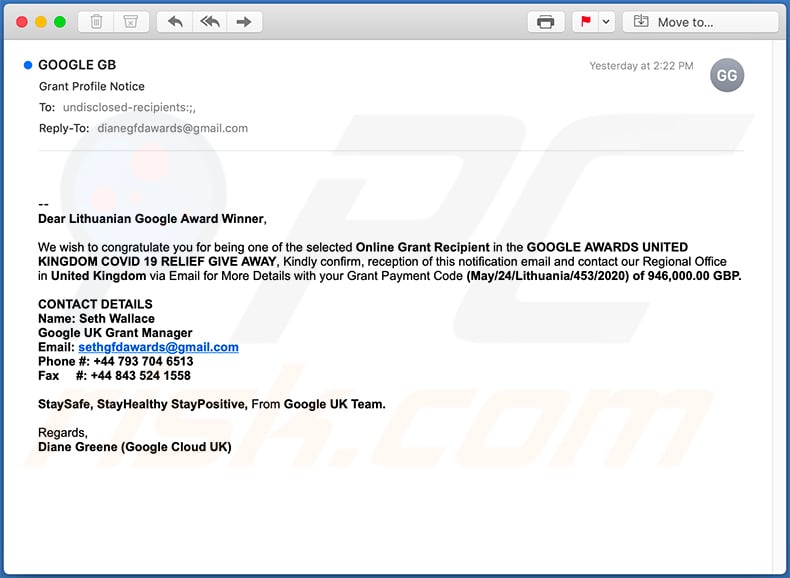
text presented within:
subject: google gb
Dear lithuania google award winner, we would like to congratulate you for being one of the selected online grant recipients in the google united kingdom covid 19 relief giveaway awards, kindly confirm receipt of this notification email and get in touch contact our regional office in united kingdom by email for details with your grant payment code (24/may/lithuania/453/2020) of 946,000.00 gbp. contact details name: seth wallace google uk grants manager email: sethgfdawards@gmail.com phone number: +44 793 704 6513 fax number: +44 843 524 1558 regards, diane greene (google cloud uk)
yet another example of a “google winner” scam email:
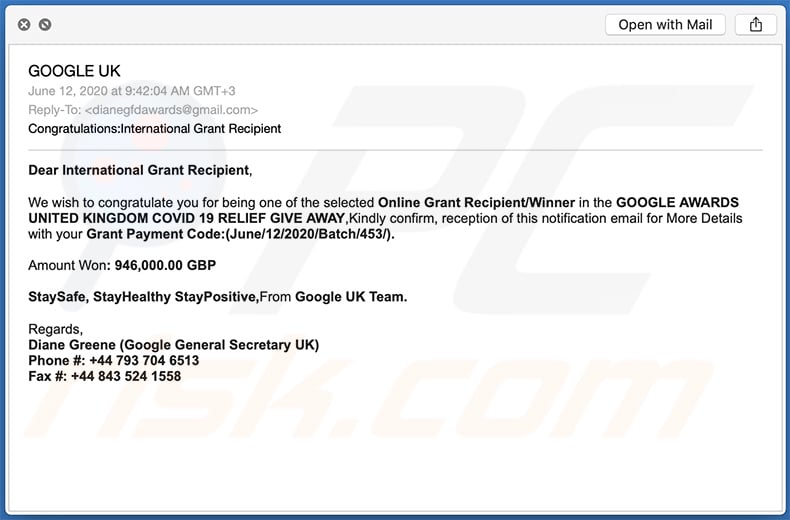
text presented within:
subject: congratulations:international scholar
dear international grant recipient, we would like to congratulate you on being one of the selected online grant recipients/winners in the google awards united kingdom covid 19 relief giveaway, kindly confirm receipt of this notification email to get more details about your grant payment code:(June/12/2020/lot/453/). amount won: 946,000.00 gbp staysafe, stayhealthy staypositive, from the google uk team. best regards, diane greene (google uk general secretary) phone number: +44 793 704 6513 fax number: +44 843 524 1558
yet another variant of spam email with the google theme:
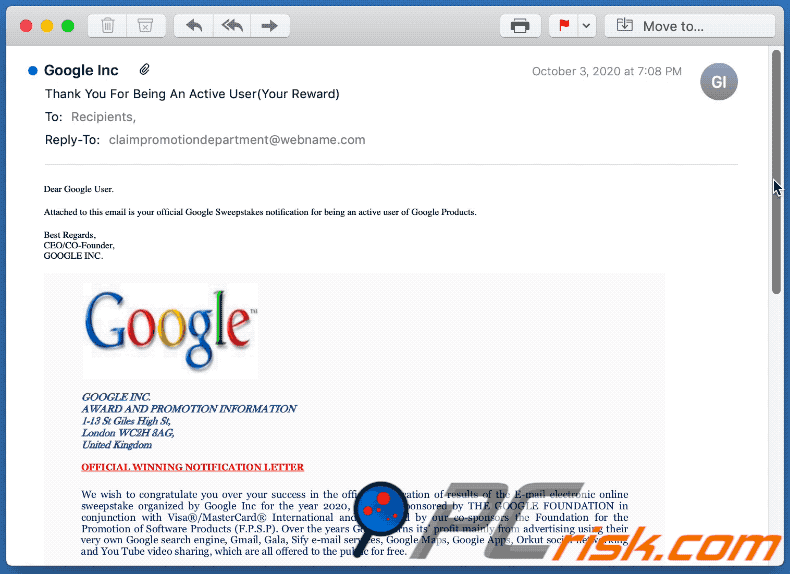
text presented within:
subject: thank you for being an active user (your reward)
dear google user.
Attached to this email is the official notification of the google giveaway for being an active user of google products.
Best regards, CEO/Co-Founder, Google Inc.
Instant automatic malware removal: Manual threat removal might be a lengthy and complicated process that requires advanced computer skills. combo cleaner is a professional automatic malware removal tool and is recommended to get rid of malware. download it by clicking the button below: ▼ download combo cleaner By downloading any software included on this website, you agree to our privacy policy and terms of use. To use the full-featured product, you must purchase a license for Combo Cleaner. 7 days free trial available. combo cleaner is owned and operated by rcs lt, the parent company of pcrisk.com read more.
quick menu:
- what is google winning spam?
- types of malicious emails.
- how to detect a malicious email?
- what to do if you fell for an email scam?
types of malicious emails:
phishing emails
Cybercriminals typically use deceptive emails to trick Internet users into providing their sensitive private information, for example, login information for various online services, email accounts, or online banking information. line.
This type of attack is called phishing. In a phishing attack, cybercriminals often send an email with the logo of some popular service (eg microsoft, dhl, amazon, netflix), create an urgency (wrong shipping address, expired password, etc.) and place a link that you hope your potential victims will click.
After clicking on the link presented in such email message, victims are redirected to a fake website that looks identical or very similar to the original one. Victims are then prompted to enter their password, credit card details, or other information that the cybercriminals steal.
emails with malicious attachments
Another popular attack vector is spam with malicious attachments that infect users’ computers with malware. Malicious attachments usually contain Trojans that are capable of stealing passwords, banking information, and other sensitive information.
In these types of attacks, the main goal of cybercriminals is to trick their potential victims into opening an infected email attachment. To achieve this goal, emails often talk about recently received bills, faxes, or voicemails.
If a potential victim is tempted to open the attachment, their computers become infected and cybercriminals can collect a large amount of sensitive information.
Although it is a more complicated method of stealing personal information (spam filters and antivirus programs often detect such attempts), if successful, cybercriminals can obtain a much wider variety of data and can collect information for a long period of time.
sextortion emails
this is a type of phishing. In this case, users receive an email claiming that a cybercriminal could access the potential victim’s webcam and has a video recording of her masturbation.
To get rid of the video, victims are asked to pay a ransom (usually using bitcoin or another cryptocurrency). however, all of these claims are false; users receiving such emails should ignore and delete them.
how to detect a malicious email?
While cybercriminals try to make their lure emails look trustworthy, here are a few things to keep in mind when trying to spot a phishing email:
- verify the sender’s (“from”) email address: hover over the “from” address and check if it is legitimate. For example, if you received an email from Microsoft, be sure to check if the email address is @microsoft.com and not something suspicious like @m1crosoft.com, @microsfot.com, @account-security-noreply.com, etc. .
- check generic greetings: if the greeting in the email is “dear user”, “dear @youremail.com”, “dear customer”, this should raise suspicions. Most commonly, companies call you by name. missing this information could indicate a phishing attempt.
- check the links in the email: hover over the link presented in the email, if the link you appears looks suspicious, don’t click on it. for example if you received an email from microsoft and the link in the email shows that it will go to firebasestorage.googleapis.com/v0… you should not trust it. it’s best not to click on any links in emails, but visit the website of the company that sent you the email in the first place.
- don’t blindly trust email attachments Electronic: Most commonly, legitimate companies will ask you to log in to their website and view any documents there; If you received an email with an attachment, it’s a good idea to scan it with an antivirus application. infected email attachments are a common attack vector used by cybercriminals.
To minimize the risk of opening malicious and phishing emails, we recommend that you use antivirus combo cleaner for windows.
example of a spam email:

what to do if you fell for an email scam?
- If you clicked a link in a phishing email and entered your password, be sure to change your password as soon as possible. Cybercriminals typically collect stolen credentials and then sell them to other groups that use them for malicious purposes. If you change your password in a timely manner, there is a chance that criminals won’t have enough time to do any damage.
- If you entered your credit card information, please contact your bank as soon as possible and explain the situation. there’s a good chance you’ll need to cancel your compromised credit card and get a new one.
- if you see any signs of identity theft, you should immediately contact the federal trade commission . this institution will collect information about your situation and create a personal recovery plan.
- if you opened a malicious attachment: your computer is probably infected, you should scan it with a reputable antivirus application. for this purpose, we recommend using antivirus combo cleaner for windows.
- help other internet users: report phishing emails to the anti-phishing working group, the reporting center FBI Internet Crime Reporting, the National Fraud Information Center and the U.S. department of justice.
